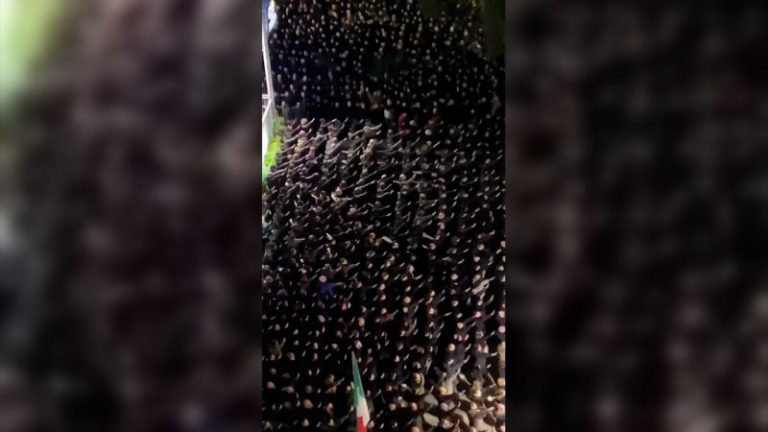A viral video of more than 150 men, clad in black and raising their right arms in a fascist salute in central Rome, has caused a stir everywhere but in the office of Italian Prime Minister Giorgia Meloni.
The event, now under investigation by Rome’s special anti-fascism police unit, took place on the evening of January 7 to mark the 46th anniversary of the Acca Larentia massacre, when three young neo-fascist militants from the Italian Social Movement (MSI) were killed on the street of that name.
Two, Franco Bigonzetti and Francesco Ciavatta, were murdered by suspected left-wing activists on the street in front of the MSI party headquarters and the third, Stefano Recchioni, by a police officer responding to riots against the first killings.
No one has ever been charged with the 1978 murders.
In the videos shot by onlookers last weekend, the saluting men can be clearly heard yelling “present” three times as they raise their right arms.
One then shouts a common neo-fascist battle cry: “For all fallen comrades.”
A commemoration of their deaths takes place every January 7, with police providing security under both left and right-wing administrations. It is consistently attended by members of both extremes of the political spectrum, who lay wreaths on a monument to the young men.
The MSI party grew from the ashes of Benito Mussolini’s National Fascist Party after it was dismantled at the end of World War II when the dictator was deposed and killed.
It is the party through which Meloni first entered politics; she led the MSI before melding it into her own more moderate Brothers of Italy party, which won snap elections in 2022.
Meloni has attended the commemoration on the Via Acca Larentia many times in the past, according to her own social media, but never as prime minister.
Italy’s opposition, including Democratic Party leader Elly Schlein, have called on Meloni to ban neo-fascist groups.
While the Italian constitution bans fascist ideology, all over the country monuments to Italy’s fascist past remain, such as an obelisk bearing Mussolini’s name in front of Rome’s Olympic Stadium.
It is a complicated area and the law – like many in Italy – is ambiguous. Being “apologetic” to old-style fascism is a crime in Italy, but neo-fascist groups are not illegal: such groups are often careful not to adopt overtly fascist ideology in their constitutions.
Nor are fascist memorabilia or gestures like the fascist salute illegal, something that critics say must change.
“This is Rome, 7 January 2024. It seems like 1924,” Schlein wrote on social media with an image of the salute. “What happened is unacceptable. Neo-fascist groups must be disbanded.”
Calling for the government to condemn the salute, Noemi Di Segna, president of the Union of Italian Jewish Communities, said laws should be tightened, calling such acts “dangerous nostalgia.”
“For a very long time, we have been calling for the regulations concerning the nostalgia for neo-fascism to be strengthened,” she said.
The episode was also condemned by Meloni’s deputy and foreign minister, Antonio Tajani – now head of the Forza Italia party after the death of Silvio Berlusconi – who said his party was anti-fascist, and that no party should celebrate dictatorships.
Meloni wasn’t at the commemoration Sunday night, and she has only addressed the uproar by branding the backlash and the calls for her to ban neo-fascist groups “attacks” on her government.
“This government continues to respond to the gratuitous attacks and exploitative controversies of recent days by certain opposition parties with facts and results,” she wrote on Facebook.
A spokesperson for Meloni said the prime minister would likely not comment further.
This stands in contrast to other countries like Germany, which have zero tolerance to other forms of fascism. Berizzi said that “in this moment neo-fascist groups feel protected by Meloni’s silence, her ambiguity. Meloni is not able to cut the cord with her past. In some ways she is hostage to her past.”
Rome’s main prosecutor has opened an investigation into the event, to determine if anyone broke the “apology for fascism” law with the fascist salute.
Italy’s General Investigations and Special Operations Division (DIGOS) has identified 150 participants, all men, of whom nine are known right-wing militants with previous fascism-related criminal charges against them, according a spokesperson for the agency.
In her first year of power, Meloni proved her promise that she had distanced herself from her neo-fascist upbringing by becoming one of the most moderate leaders in Europe, where she has been praised for her leadership on issues ranging from Ukraine to migration. But her silence on the domestic issue now shaking the country may change all that.
On Tuesday, the European Parliament in Strasbourg will take up the case when it debates the resurgence of neo-fascism in Europe. Ewan MacPhee, spokesperson for the Social Democrats in the European Parliament, warned they plan to take the debate seriously.
“We find the prime minister’s silence even more disconcerting, and we wonder why she didn’t condemn the events of January 7,” MacPhee said ahead of the Tuesday meeting, according to the Italian media. “The debate becomes necessary and it is important that Parliament does what Meloni seems unable to do: that is, condemn what happened.”

